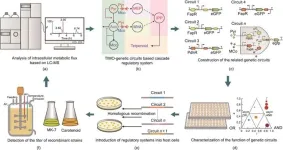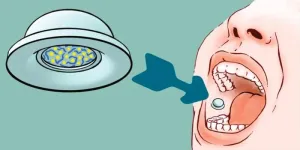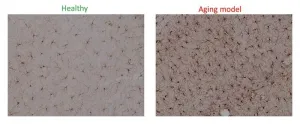(Press-News.org) From long-frozen and potentially dangerous pathogens awakening in Arctic permafrost to emerging heat-related hazards in human pregnancy, ongoing climate change presents new challenges for human health. In this Special Issue, Science’s News Department offers a collection of five news stories highlighting several facets of the complex intersection between heat, disease, and human health and the researchers seeking to understand related emerging threats.
In one Feature, Science Correspondent Kai Kupferschmidt discusses how infectious diseases, particularly malaria, are affected as the world warms. According to the report, the list of impacts is long – pathogen-carrying insects could multiply faster and spread farther; more frequent droughts or floods could expose more people to dangerous waterborne microbes; migrating animals could create new opportunities for zoonotic spillovers; global patterns of respiratory infections like influenza could change; and fungal pathogens could adapt to warmer temperatures and become more adept at infecting human hosts. This Feature profiles several researchers seeking to understand the complex and nuanced link between malaria and climate change.
Another Feature, by Science Staff Writer Meredith Wadman, highlights the growing concern of intense heat as a particular hazard in pregnancy and the research probing why. A growing number of epidemiolocal studies have linked heat exposure to poor pregnancy outcomes, including pre-term birth, low birth weight, congenital anomalies, and perinatal mortality. However, much less research explains how pregnant people biologically respond to heat stress and how this impacts fetal development at various stages of pregnancy. These questions have sparked new research projects to answer these questions, particularly among those in some of the globe’s most vulnerable regions, like Africa and Southeast Asia.
In a third Feature, Science Correspondent Vaishnavi Chandrashekhar reports from Mumbai, India, on efforts to understand how heat affects the nation’s urban areas and how researchers are helping authorities improve emergency response plans to the growing number of deadly heat waves.
Lastly, two stories by Science Staff Writer Jon Cohen highlight environmental threats related to climate change that could pose emerging risks to human health. Migratory birds are known vectors and can efficiently carry pathogens around the world. However, as climate warming reshapes some birds’ journeys, new opportunities are being created for infectious disease transmission, including spillover into humans. How climate-driven changes in bird migration affect disease risk and the efforts underway to guard against it is explored in one story. Another story investigates how climate change may resurrect dangerous pathogens frozen for centuries in now thawing Arctic permafrost.
**Please Note – Non-Standard Embargoes**
The stories in this Special Issue will publish over the course of the week, with the embargoes lifting as follows:
Introduction and 'Feeling the Heat': Tuesday, 26 September at 14:00 US ET
'Flight Risks' and 'Lurking in the Deep Freeze?': Wednesday, 27 September at 14:00 US ET
'Expecting Extremes' and 'Heatproofing India': Thursday, 28 September at 14:00 US ET END
Science News Special Issue: Heat and Health
2023-09-28
ELSE PRESS RELEASES FROM THIS DATE:
Innovative approach reveals environmental mechanisms of the end-Cretaceous extinction
2023-09-28
A novel approach to a question that’s been widely investigated reveals more insights about the environmental forcings associated with the end-Cretaceous mass extinction, suggesting that volcanism and other biological changes imparted stress on the global carbon cycle across the Cretaceous/Paleogene (K/Pg) boundary. In addition to providing new insights into the factors that contributed to extinction, the approach could be useful in disentangling other complex perturbations in the Earth system and their associated climatic and biological impacts. The end-Cretaceous mass ...
Ethical guidelines needed before human research in commercial spaceflight is ready for liftoff
2023-09-28
A global, multidisciplinary team of bioethicists, health policy experts, commercial spaceflight professionals and space health researchers, including Rachael Seidler from the University of Florida, has developed guiding principles and best practices to help ensure human research conducted in space is safe and inclusive.
The proposed ethical guidelines were released Friday in a policy paper published in Science and are the result of a workshop held at the Banbury Center of Cold Spring Harbor Laboratory funded by the Translational ...
Van Andel Institute chief scientist earns $7.9 million Outstanding Investigator Award to support cancer research
2023-09-28
GRAND RAPIDS, Mich. (September 28, 2023) — Van Andel Institute Chief Scientific Officer Peter A. Jones, Ph.D., D.Sc. (hon), has received a seven-year, nearly $7.9 million grant from the National Cancer Institute’s Outstanding Investigator Award program. The funding will fuel his research into the epigenetic errors that drive cancer development — and help him find ways to fix them.
The award is a renewal of an earlier seven-year, $7.8 million Outstanding Investigator Award granted to Jones in 2017. The National Cancer Institute, a part of the National Institutes of Health, launched the Outstanding Investigator Award program in 2014 to support “investigators with ...
NUTRITION 2024 makes its way to Chicago
2023-09-28
Rockville, MD (September 28, 2023) – The American Society for Nutrition (ASN) announced today that its annual meeting, NUTRITION 2024, will take place in Chicago, Illinois, June 29 - July 2, 2024. NUTRITION 2024 is the premier meeting for the nutrition community, exploring developments in clinical and translational nutrition, food science and systems, diet and disease, basic science, global health, and more. Nutrition scientists are invited to share their research and join together with clinicians, policy experts, industry, and the media to network and learn for 3.5 exciting days in Chicago.
"I look forward to being together with the best in our field. From groundbreaking ...
Innovative approach unveiled: Boosting terpenoid bioproduction via remodeling of isoprene pyrophosphate metabolism
2023-09-28
Terpenoids, the largest family of natural products, have gained significant attention for their diverse applications in industries such as pharmaceuticals, fragrances, and biofuels. However, the efficient synthesis of terpenoids using engineered cell factories has been hindered by the limited supply of isoprene pyrophosphate (IPP), the key building block for terpenoid production. Now, a research team led by Jian Chen at Jiangnan University in China has made a groundbreaking discovery that could revolutionize terpenoid bioproduction.
In their research article published in the journal Engineering, Chen and his team unveil a novel approach to address the challenge of insufficient IPP ...
The University of Manchester secures major bioscience funding to harness the activity of microbiomes for a more sustainable future
2023-09-28
Scientists at The University of Manchester are set to receive a multi-million-pound grant to advance our understanding of interactions in microbiomes and how they might impact the world around us.
The research, funded by the Biotechnology and Biological Sciences Research Council’s (BBSRC) strategic Longer and Larger (sLoLa) grants programme, takes the first major step towards understanding complex microbial communities and will support the move towards a more sustainable and Net Zero ...
How a suction cup delivers medications to the bloodstream
2023-09-28
Many of today’s medications belong to groups of relatively large molecules such as peptides. They are used to treat a wide range of diseases, including diabetes, obesity and prostate cancer. Unfortunately, taking these medications in tablet form is out of the question in most cases because they would break down in the digestive tract or remain too large to reach the bloodstream. Consequently, the patient’s only option is to receive their medication via injection.
A group of researchers at ETH Zurich have developed ...
Scientists observe the influence of gravity on antimatter for the first time
2023-09-28
Scientists have demonstrated the existence of gravity between antimatter and Earth, reaffirming Albert Einstein’s General Theory of Relativity.
It is thought that Isaac Newton's historic work on gravity was inspired by watching an apple fall to Earth from a tree. But for decades, scientists have wondered what would happen to an “anti-apple” made of antimatter - would it fall in the same way if it existed?
Until now, the question has left scientists with an incomplete picture of the Universe's gravitating content.
In a paper published today in Nature, the ALPHA collaboration at CERN’s Antimatter Factory, which ...
NYU Tandon School of Engineering Researchers unveil tool to help developers create augmented reality task assistants
2023-09-28
Augmented reality (AR) technology has long fascinated both the scientific community and the general public, remaining a staple of modern science fiction for decades.
In the pursuit of advanced AR assistants – ones that can guide people through intricate surgeries or everyday food preparation, for example – a research team from NYU Tandon School of Engineering has introduced Augmented Reality Guidance and User-Modeling System, or ARGUS.
An interactive visual analytics tool, ARGUS is engineered to support the development of intelligent AR assistants that can run on devices like Microsoft ...
Specific interneurons are important in aging-associated cognitive decline, study finds
2023-09-28
Normal aging is usually associated with a decline in memory, although it is unclear what factors play a role. In a new study, researchers studied specific interneurons, which serve as communication centers that connect other neurons, in the regions of the brain that are important for learning and memory.
Increasing age places people at risk, whether it is because of a normal decrease in cognitive ability or due to postoperative cognitive disorders. In the latter, the deficits can persist for many months after surgery especially when the patients are older than 60. Unfortunately, the ...



